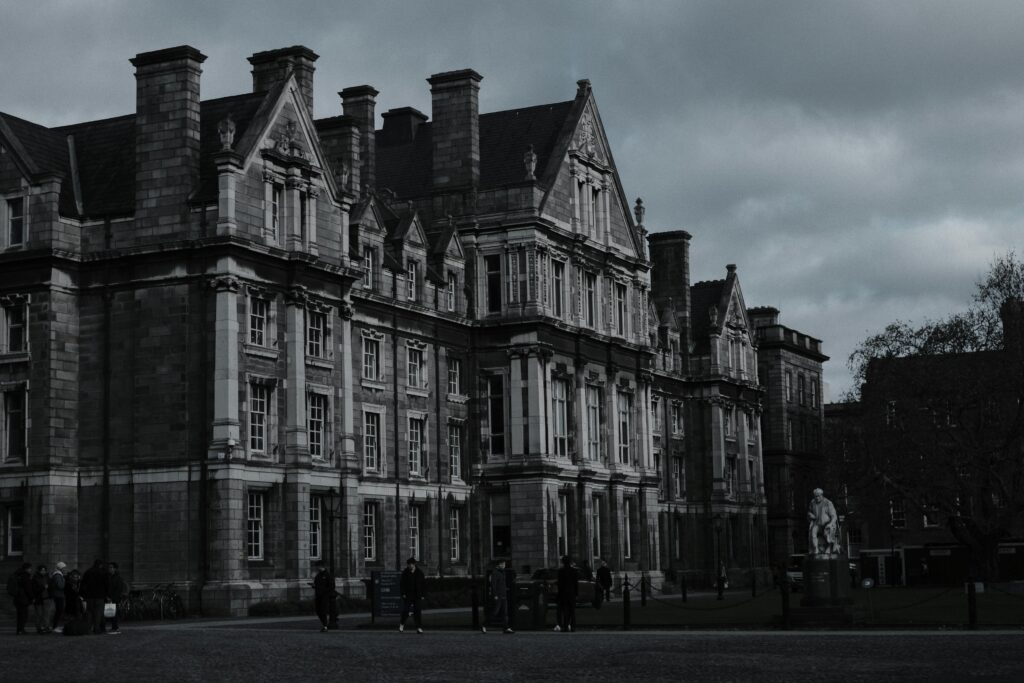Choosing the right university is one of the most important decisions an international student can make, shaping not only their academic journey but also their professional and personal growth. Ireland, with its rich cultural heritage, vibrant cities, and globally recognized education system, has become a top choice for students from around the world. Known for its friendly communities and innovative learning environments, Ireland provides a unique blend of traditional education and modern research opportunities across its universities.
This guide is designed to help international students navigate the many options available, considering factors such as academic strengths, campus life, and the overall cost of living. By making an informed decision, students can ensure their university experience in Ireland is both fulfilling and aligned with their long-term goals.
For additional guidance, students can visit Education in Ireland, the national organization that provides information and resources on studying in Ireland, including university profiles, application tips, and scholarship opportunities. This resource can be an invaluable starting point for those ready to explore their options and make Ireland their academic home.

Understanding Your Academic Goals for Ireland
When choosing a university, the first step is to understand your academic goals to ensure the program you choose is in line with your interests and career aspirations.
A. Identify Your Field of Study
Ireland has a wide range of programs that attract students from a wide variety of fields. Popular areas of study include technology and engineering, driven by Ireland’s rapidly growing tech industry; business and finance, programs that cater to the country’s strong international business environment; and the humanities, which explore Ireland’s rich cultural and literary heritage. Choosing a field that excites you can make a significant difference in both your academic engagement and career prospects after graduation.
B. Determine Your Degree Level
Irish universities offer different degree levels, so it’s essential to understand which one is best suited for you. Undergraduate programs typically last three to four years and provide a foundational knowledge of a subject, while postgraduate programs – including master’s degrees and postgraduate diplomas – allow you to specialize further. For those interested in intensive, research-focused learning, PhD and research programs offer opportunities to work with renowned academics and contribute to cutting-edge advances in their field. Knowing your desired level of study will help you narrow down the universities and programs best suited to your needs.
C. Research The Course Content and Structure
It’s important to dive into the specifics of each program you’re considering, taking a close look at course modules, core and elective options, and any practical learning opportunities. Many Irish programs integrate work placements or research projects, allowing students to apply their knowledge in a real-world setting. Reviewing these details can give you a clear picture of what your day-to-day academic life will look like and ensure the program aligns with both your learning style and career goals.
For more guidance, students can use the Qualifax website, Ireland’s national learners’ database, which provides comprehensive information on courses and qualifications, including course modules, degree levels, and career opportunities. It’s an excellent tool for comparing programs and making sure the academic path you choose matches your aspirations.
University Rankings and Reputation In Ireland
University rankings and reputation are important factors to consider when choosing the right institution, as they often reflect the quality of education, faculty, and resources available to students.
A. Overview of University Rankings
Global and national rankings can provide a snapshot of an institution’s reputation and strength, helping students understand how universities compare in Ireland and internationally. Rankings such as the QS World University Rankings or the Times Higher Education (THE) World Rankings assess universities based on academic reputation, research output, and student-to-faculty ratio. While rankings shouldn’t be the only factor in your decision, they can provide a useful perspective on the academic and research standards of different institutions.
B. Reputation in Your Chosen Field
Beyond general rankings, it’s also worth looking at how universities perform in your specific field of study. For example, if you’re interested in studying technology, institutions such as Trinity College Dublin and University College Dublin have strong technology programs and partnerships with global tech firms. Researching schools with well-established departments in your chosen field can give you access to exclusive resources, expert faculty and connections within industry, which can enrich your education and enhance your career prospects.
C. Alumni Success and Industry Connections
A university’s reputation often extends to its alumni network and relationships with industry leaders. Universities with strong connections to employers and successful alumni can open doors for students through internships, mentorship programmes and job opportunities. Graduates from prestigious institutions are often well-respected in the job market, as their alma mater can act as a seal of quality. Knowing that a university has a track record of alumni success can be a huge advantage when starting your career.
For more detailed information, students can use UniRank, a comprehensive directory that covers Irish and international universities and includes data on alumni achievements, industry partnerships and specific department rankings. This is a useful resource for students who want to evaluate universities based on more than just overall scores.

Location Considerations In Ireland
Location is an important factor when choosing a university in Ireland, as it can affect your daily life, budget and overall experience as a student.
A. Urban vs. Rural Environment
Studying in an urban area such as Dublin, Galway or Cork offers a vibrant social scene, diverse food options and extensive facilities. These cities are also known for their busy job markets and internship opportunities, which can be beneficial for students seeking work experience. However, the downside is often the higher cost of living and fast-paced environment. On the other hand, smaller cities and rural campuses offer a quieter, more intimate experience that can be ideal for students seeking a focused academic setting. Smaller cities such as Maynooth or Carlow generally offer more affordable housing and a relaxed lifestyle, but may have fewer job and social opportunities.
B. Accessibility and Transportation
The ease of access to and from your campus can make a big difference in your student life experience. Cities like Dublin have well-developed public transportation systems, including buses, trams, and trains, which can make commuting easy and affordable. Many rural campuses also offer reliable transportation options, but may require planning to get around. Understanding transportation options, from local buses to campus shuttles, can help you estimate how much time you need and budget for daily travel.
C. Cost of Living in Different Areas
The cost of living can vary widely in different areas of Ireland. Dublin, being the capital, generally has higher rents and general living costs, especially in central areas. Cities like Cork and Galway tend to have slightly lower costs of living, while smaller towns can be even more budget-friendly, where rents and daily expenses are cheaper. When budgeting, it is important to take into account housing, utilities, food, and transportation to avoid unexpected costs.
For a more detailed comparison, Numbeo provides up-to-date data on the cost of living in Irish cities, including essentials like rent, groceries, and transportation. This resource can help students create their budget and decide which location best suits their lifestyle and financial situation.
Ireland Campus Life and Support Services
Campus life and support services play a key role in shaping your university experience, providing not only academic resources but also the community and support you will need to thrive in a new environment.
A. Understanding Campus Facilities
Universities in Ireland typically offer a range of facilities to support students academically and recreationally. Libraries typically contain digital and physical resources, study rooms and computer labs, where students can work on assignments and do research. Many universities also have specialised laboratories for science and engineering students. Sports and recreational facilities are also common, with gyms, playgrounds and fitness classes available on most campuses, giving students a chance to stay active and de-stress.
B. International Student Support Services
For international students, having access to dedicated support services can make the transition to a new country much easier. Many universities offer orientation programmes that introduce students to the campus, city and local culture. Support services often include counselling, mental health resources and academic advice to help students adapt to the demands of university life. These services are designed to provide international students with a network of support and guidance during their studies, so that they feel at home and supported as they navigate their new academic environment.
C. Student Societies and Extracurricular Activities
Joining clubs and societies can be a great way to make friends, develop new skills and pursue hobbies alongside your studies. Irish universities have a wide range of student societies, from academic and cultural clubs to sports and arts groups, providing opportunities for personal development and connecting with others who share your interests. These activities are more than just fun – they are a vital part of the university experience, giving students a sense of belonging and enriching their time on campus.
To find out more about the specific services and societies offered by each university, Campus.ie is a useful resource that provides information on campus facilities, support services and extracurricular activities available at Irish universities. It’s a great tool for international students who want to get a feel for the campus experience before choosing a university.

Financial Considerations
Financial considerations are essential for international students planning to study in Ireland, as managing tuition, living expenses, and potential income sources can help ensure a seamless and stress-free experience.
A. Tuition Fees and Financial Aid In Ireland
Tuition fees for international students in Ireland vary depending on the university, program, and level of study. Generally, undergraduate programs range from €10,000 to €25,000 per year, while postgraduate courses can go up to €30,000 or more, especially for specialized degrees. Scholarships are available through a variety of sources, including the Irish government, specific universities, and private organizations. Some popular scholarship options include the Government of Ireland’s International Education Scholarships and university-specific awards that support international students based on merit and need. By exploring these opportunities in advance, students can plan their finances and potentially reduce their tuition costs.
B. Estimating The Cost of Living In Ireland
The cost of living in Ireland depends on location and lifestyle. For international students, monthly expenses typically include housing (€500–€1,200), food (€200–€400), and transportation (€80–€150). Other personal expenses, such as health insurance and entertainment, must also be taken into account. Dublin is Ireland’s most expensive city, where housing and food costs are higher than in smaller cities or rural areas. Living in shared accommodation or opting for on-campus housing can often be more affordable and convenient.
C. Part-Time Work Opportunities In Ireland
International students in Ireland are allowed to work part-time (up to 20 hours per week during term time and 40 hours during breaks), which can be a helpful way to manage living expenses. Part-time roles in retail, hospitality, and tutoring are typically available to students and can provide valuable experience alongside their studies. However, it is essential to balance work with academic responsibilities to ensure a manageable workload. For the latest information on costs, potential income and specific rules for working as a student, Education in Ireland provides plenty of information on budgeting, scholarships and employment opportunities for international students. It is a useful resource for understanding the financial landscape of studying in Ireland and planning accordingly.

Application Process and Entry Requirements In Ireland
Navigating the application process is crucial for international students looking to study in Ireland. From understanding admission criteria to preparing an attractive application, staying organised can help secure a place at the university of your choice.
A. Understanding Admission Criteria In Irish Universities
Irish universities have specific admission requirements for international students, which vary depending on the programme and level of study. Generally, undergraduate applicants have to have completed secondary education and meet certain grade requirements in relevant subjects. For postgraduate study, a recognised bachelor’s degree and relevant academic background are usually required. Most universities also ask for English proficiency tests such as IELTS or TOEFL, although some will accept other equivalents. Researching each university’s criteria is essential to ensure you meet their standards and can prepare the required documents in advance.
B. Application Timeline and Deadlines
It’s important to stick to application deadlines, as a missed one can delay or even jeopardise your study plans. Many undergraduate applications go through the Central Applications Office (CAO), whose deadlines are usually in February, although some courses may have earlier deadlines. For postgraduate study, deadlines vary by program and can be as early as December for competitive courses. Organizing documents such as transcripts, letters of recommendation and test scores ahead of time will help you submit a strong application without stress.
C. Preparing For Interviews and Personal Statements
Many Irish universities require a personal statement or interview as part of the application process, particularly for postgraduate and competitive programs. A well-crafted personal statement should demonstrate your passion for the subject, relevant experience and reasons for choosing that particular university. For interviews, researching the program and preparing thoughtful answers about your academic and career goals can help you stand out. Being authentic and clear about your aspirations will help admissions teams understand why you are a good fit for their institution.
For additional resources, Study in Ireland offers guides on the application process, including details on entry requirements, deadlines, and tips for preparing a great application. This is a valuable resource for international students who want to stay organized and confident during the application journey.

Making the Final Decision
When it comes time to decide which university to attend, thoughtfully evaluating the options and trusting yourself can ensure you choose the path that’s right for you.
A. Evaluating The Pros and Cons
It’s essential to weigh each university’s offerings against your personal preferences – whether that’s academic reputation, campus facilities or location. Make a list of each university’s pros and cons based on factors such as program content, scholarship opportunities, cost of living and extracurricular options. This exercise can help you see which institution most closely matches your goals and lifestyle, making it easier to narrow down the options.
B. Trusting Your Gut Instinct
While looking at data and rankings is helpful, sometimes a gut feeling is just as important. If a university stood out during a campus tour or struck a chord with you when talking to faculty, trust that gut instinct. University life is about more than just studying; It’s about finding a place where you’ll feel comfortable, supported and inspired to move forward. Trusting your instincts can lead you to an environment that feels like a second home to you.
C. Seeking Guidance From Others
Choosing a university is an important choice, and seeking advice from family, friends or academic advisors can provide new perspectives. They may highlight aspects you hadn’t considered or share insights based on their own experiences. In particular, academic advisors can offer guidance about how your choice may impact career options, helping you make an informed decision.
For more resources, UniBuddy connects prospective students with current international students at Irish universities, providing first-hand information about campus life, academics and more. Talking to someone who’s already lived this experience can provide a realistic perspective and help you feel more confident in your choice.


